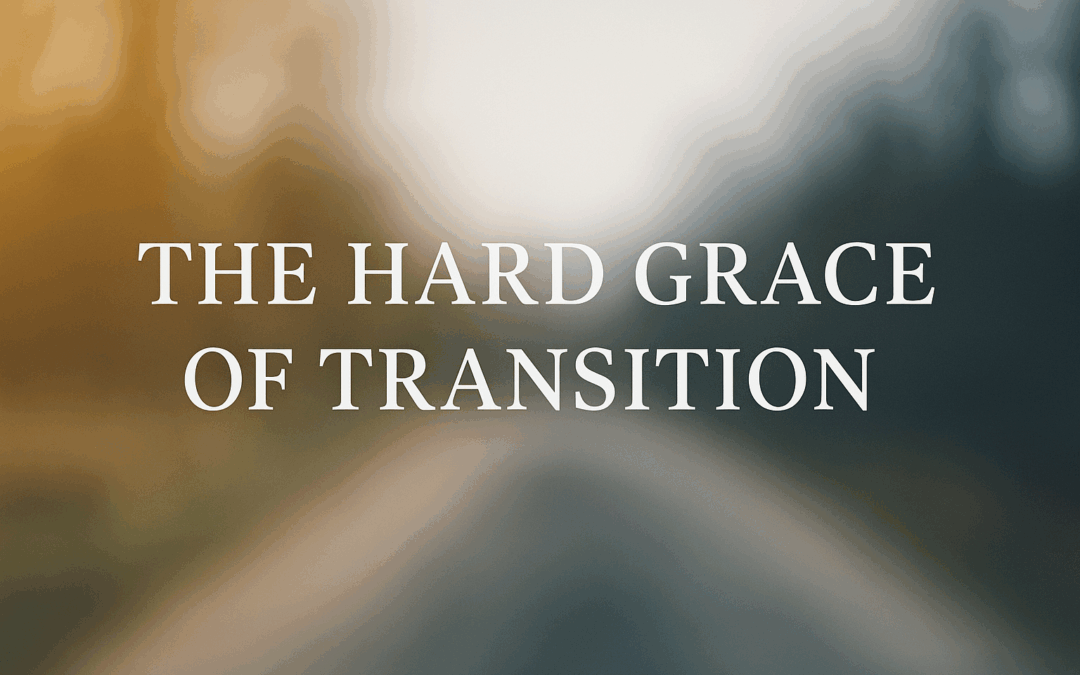I’ve come to know grace in two forms: the kind that comforts, and the kind that refines. The second one’s harder to talk about.
They say “idle hands are the devil’s workshop.”
I used to think that was just a grumpy old proverb someone’s grandma made up to keep kids from fidgeting in the pews.
Then again, I’m pretty sure I was told that a time or two—especially with my ADHD-like energy and inability to sit still. And while I laughed it off back then, I’ve come to realize… there’s some truth in it.
Not because rest is bad. But because unstructured space is where anxiety loves to live—especially during transitions.
And after years of raising kids, leading student homes, pastoring youth, and navigating more personal moves than I can count, I’ve learned this:
It’s not the big moments that throw us off.
It’s the in-between.
The five minutes before bedtime.
The car ride after a hard conversation.
The stretch of days between one season ending and another beginning.
The ache of waiting on a prayer you’re not sure will be answered—or when.
That’s where the cracks show.
That’s where emotions spike.
That’s where anxiety rises and patience wears thin.
And I’m not just talking about kids who have been in our care. I’m talking about our own family—our kids who’ve walked with us through every hard move and unknown.
 We’ve moved more times than I can count—New York, Pennsylvania, New Hampshire, Colorado, Nebraska.
We’ve moved more times than I can count—New York, Pennsylvania, New Hampshire, Colorado, Nebraska.
Moving this many times is considered an ACE (Adverse Childhood Experience).
Our kids have experienced enough major transitions that, if life changes were tallied like trauma scores, they’d qualify.
It’s why I’ve joked that we’re not saving for college—we’re saving for therapy.
(Only half joking.)
Although each transition came with purpose—and many were led by conviction—some were shaped by circumstances we couldn’t control. That doesn’t mean they didn’t cost something. They always do.
Transitions challenge our nervous systems. They challenge our sense of identity. And they expose what’s unresolved beneath the surface.
If you don’t name the transition, it’ll name you. It’ll come out sideways—through irritability, disengagement, control, or even hyper-spiritualizing what’s really just grief.
What I’ve had to relearn—over and over—is that God meets us in the middle.
Not just in the calling to something, but in the letting go of what was.
“They all wept as they embraced him and kissed him. What grieved them most was his statement that they would never see his face again.”
—Acts 20:37–38
That’s not emotional weakness. That’s sincere leadership.
That’s a love that holds space and still moves forward.
Jesus, too, taught His disciples to release the places and people who wouldn’t receive them—not with bitterness, but with peace.
Shake the dust. Carry grace. Move on.
Not every transition needs a speech.
But it does need intentionality.
You can name what it meant.
You can honor what it cost.
You can carry love and still move on.
Because transitions are where the cracks show—
but they’re also where grace can grow.
P.S.
I believe God never leaves us or forsakes us.
But I also know how it feels when transition makes that hard to believe.
Sometimes the pain of change clouds the presence of God.
Sometimes obedience leads to grief before it brings clarity.
And sometimes we wonder if we got it wrong—simply because it hurts.
If that’s where you are right now, you’re not alone.
You’re not faithless. You’re human.
And I still believe this to be true:
God meets us not just in the calling to something—but in the letting go of what was.
So keep walking. Keep trusting.
Even in the fog, He’s with you.


Thanks, Roy. Sometimes it seems like life has been one unending transition. This was really helpful.
Mike, it sure can feel that way at times. I have often wondered His plan…but I will never trust His plan if I don’t trust His character…prayers you find rest, sabbath and direction.
That sure applies to us all no matter what age group we are in, just life but with God in control